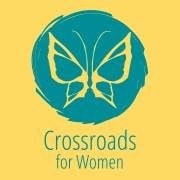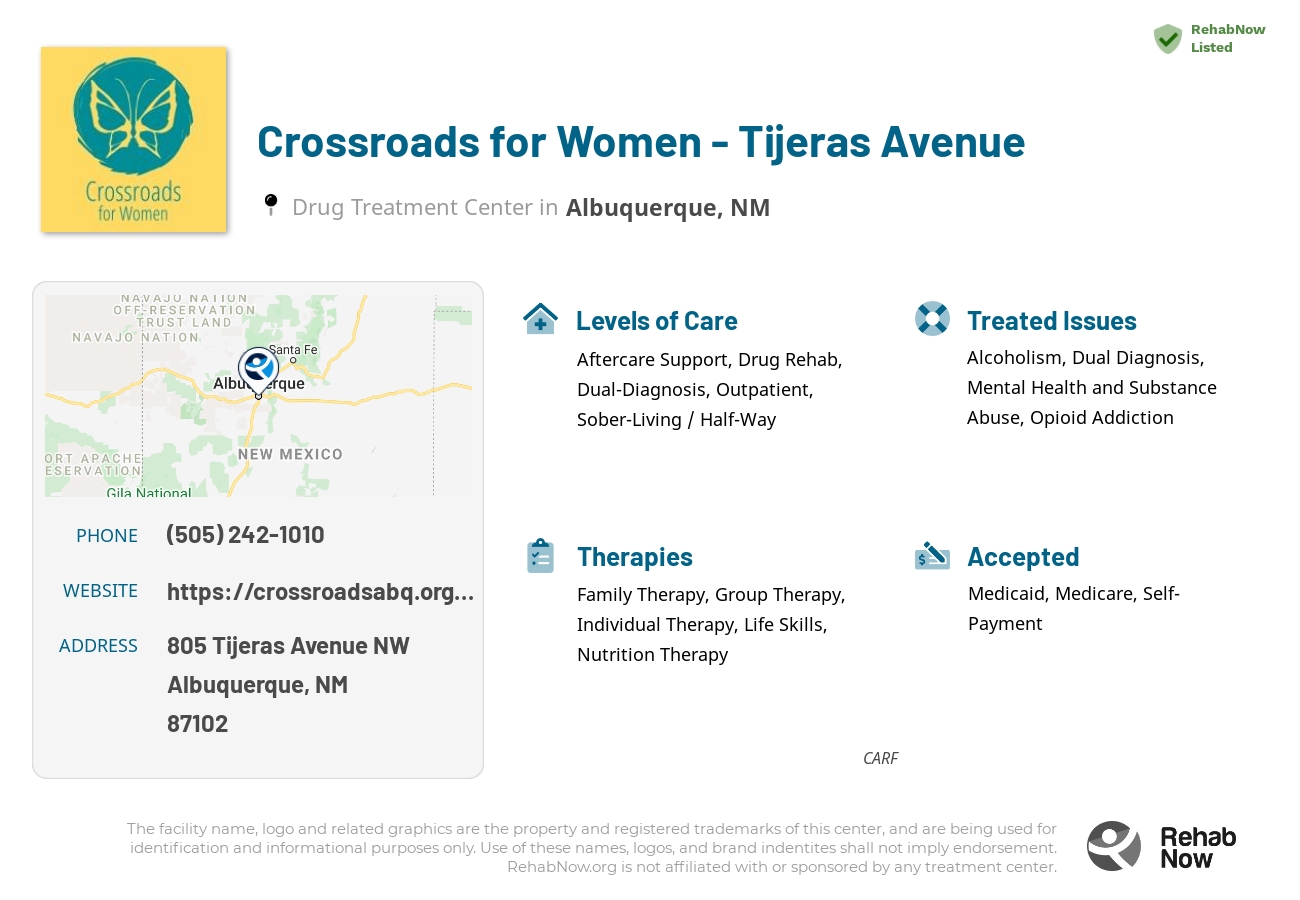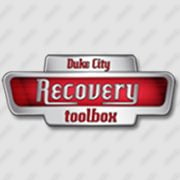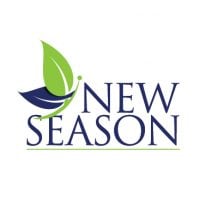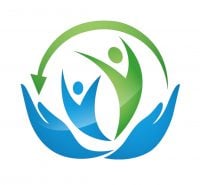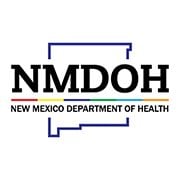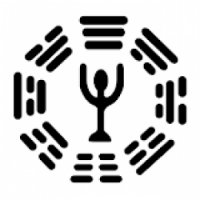Crossroads for Women - Tijeras Avenue
Drug Rehab Center in Albuquerque, New Mexico
Crossroads for Women - Tijeras Avenue is an accredited substance abuse and addiction treatment facility offering outpatient counseling, education, and support services, as well as specialized programs for pregnant and postpartum women and substance-dependent mothers.
About This New Mexico Facility
Crossroads for Women - Tijeras Avenue in Albuquerque, New Mexico is a substance abuse and addiction treatment facility. It offers outpatient counseling, education, and support services to help individuals develop sustainable and long-term strategies to remain sober. The program utilizes evidence-based practices, such as individual and group counseling, 12-Step programs, and relapse prevention strategies, to help clients build the necessary skills to cope with daily life and resist peer pressure. In addition to individualized treatment plans, Crossroads for Women - Tijeras Avenue also offers specialized programs for pregnant/postpartum women and substance-dependent mothers.
Crossroads for Women - Tijeras Avenue offers comprehensive services for clients dealing with substance abuse and addiction. The facility has an experienced team of psychologists, counselors, and therapists offering services such as cognitive-behavioral therapy, motivational interviewing, family therapy, EMDR therapy, and more. These services are tailored to the individual needs of the client and help them identify the underlying issues that drive their addiction. In addition, the facility has a range of educational and self-help classes, to help clients develop resilience and the necessary skills to stay sober. The team also focuses on relapse prevention, helping clients explore their triggers and set goals that lead to long-term recovery.
Crossroads for Women - Tijeras Avenue is accredited by the Commission on Accreditation of Rehabilitation Facilities (CARF) and the New Mexico Behavioral Health Services Licensure and Certification Board. The facility also has an experienced team of board-certified doctors and psychiatrists providing medication-assisted treatment and prescribing medication where necessary. In addition, the facility hosts several support groups and alumni programs, helping clients stay connected and engaged in their recovery journey.
Genders
Ages
Modality
Additional
Accreditations

CARF
The Commission on Accreditation of Rehabilitation Facilities (CARF) is a non-profit organization that specifically accredits rehab organizations. Founded in 1966, CARF's, mission is to help service providers like rehab facilities maintain high standards of care.
Conditions and Issues Treated
Many people who struggle with opioid addiction need to attend specific programs like methadone , Suboxone or Vivitrol clinics.
These types of programs will provide the patient with legal, prescription medications that can help them overcome their cravings for illegal opioids like heroin or fentanyl . If the patient has a chronic condition like Hepatitis C, they must undergo treatment before they can begin taking these medications.
Dual Diagnosis refers to someone who is both dealing with addiction and another mental health issue.
There are different kinds of Dual Diagnosis: A person who simultaneously experiences both a mental illness and an addiction disorder. Or, a person who experiences one or more coexisting (simultaneous) mental health conditions in addition to a primary substance use disorder.
Some conditions that commonly co-occur with addiction include:
- Personality Disorders (Borderline, Narcissistic)
- Mood Disorders (Bipolar Disorder, Depression, Anxiety Disorder)
- PTSD (Post Traumatic Stress Disorder), OCD (Obsessive Compulsive Disorder), ADHD (Attention Deficit Hyperactivity Disorder)
- Schizophrenia, Psychosis, Hallucinations, Delusions
Levels of Care Offered at Crossroads for Women - Tijeras Avenue
This center offers a variety of custom treatment tailored to individual recovery. Currently available are Aftercare Support, Drug Rehab, Dual-Diagnosis, Outpatient, Residential, Sober-Living / Half-Way, with additional therapies available as listed below.
Outpatient treatment programs provide drug and alcohol addiction treatment through individual sessions with a counselor, group therapy, 12-step meetings, and other activities to help individuals gain sober living skills. Most programs are designed for those individuals who have completed a medically supervised detoxification program and provide opportunities for clients to begin the process of early recovery.
Outpatient programs also offer a level of medical support as needed and psychological backing through therapy. Clients are encouraged to live at home, though there may be some flexibility regarding this requirement based on the circumstances and needs of each patient.
Outpatient treatment is perhaps the most common type of dual diagnosis program available. It does not pose a significant financial burden on patients. However, it is essential to note that outpatient treatment does not provide the support and supervision given in residential programs. Some addicts may need this level of support to maintain their sobriety.
Sober Living Home (SLH) is a term used to describe houses where people recovering from addiction can stay. The goal of these places is to provide immediate support and protection that the addict needs and force them to live a life free from substance abuse.
SLH’s typically allow the addict to live there for 30, 60, or 90 days. This is intended to enable the addict time to develop a foundation of “sobriety,”; allowing them to adjust to living without the substance while building new life skills. During this time, addicts also typically attend regular addiction, education classes.
Residential treatment programs are those that offer housing and meals in addition to substance abuse treatment. Rehab facilities that offer residential treatment allow patients to focus solely on recovery, in an environment totally separate from their lives. Some rehab centers specialize in short-term residential treatment (a few days to a week or two), while others solely provide treatment on a long-term basis (several weeks to months). Some offer both, and tailor treatment to the patient’s individual requirements.
People who have completed a rehab program often need continued support from the addiction treatment team in order to remain abstinent from drugs and alcohol. Aftercare can be beneficial for personal, social, and emotional growth.
Common aftercare options include:
- Individual Therapy – this type of addiction counseling is available on a one-on-one basis. This can be beneficial for people with a high degree of emotional turmoil and a strong desire to overcome addiction.
- Group Therapy – this type of addiction counseling is available in a group setting. This type of treatment can be beneficial for people who are unable to attend regular therapy appointments due to other responsibilities.
- Family Therapy – this type of addiction counseling is available to the family members of addicts. This can be beneficial for people who are unable to fully comprehend what their loved ones are experiencing due to addiction.
Therapies & Programs
Therapy sessions focused on the individual addict can provide much-needed guidance as they work toward overcoming their addiction. These types of sessions typically involve guidance from a therapist, who will help addicts identify and process their feelings and cravings.
During these sessions, addicts may develop plans for coping with the triggers that typically lead to relapse and learn how to avoid those triggers during their recovery process.
The main goal of family therapy for drug addiction is to create an environment where communication can occur without judgment, hostility, or blame that often occurs within a family.
Family therapy is a type of group problem-solving that aims to improve communication and relationships between the patient, their family, and sometimes friends. The therapist is with the family as they learn to communicate with each other differently, especially with the addict when s/he is using.
The family can learn to reduce their enabling behavior or rally together and support each other during tough times. The patient also learns how to deal with their addiction and maintain sobriety while interacting with the family.
Different types of addiction treatment services are available. Within this article, group therapy is of interest due to its high success rate compared to individual therapy. Group therapy settings are beneficial because they allow recovering addicts to build a strong support network.
Benefits of group therapy are:
- Reduces feelings of isolation
- Immediate access to social support in the form of fellow addicts in recovery
- Lowers risk of relapse
- Increases rate of sobriety
- Builds coping skills that can be applied to everyday life
Those struggling with addiction in New Mexico can benefit from learning certain life skills. It is not as simple as quitting drinking or taking drugs and thinking that the hard part is over. Being sober means living a whole new way of life. Many recovering addicts have found that they need to develop talents like time management, organization, communication skills, socialization skills, and self-esteem to make their life in sobriety work.
Drug and alcohol addiction can lead to a breakdown in life skills. Learning certain life skills can help those who are struggling with addiction. Life skills training at Crossroads for Women - Tijeras Avenue in Albuquerque, NM teaches patients skills such as time management, budgeting, and social abilities to improve their quality of life and prevent relapse.
An addict’s life skills are maladaptive, meaning they are counterproductive. An addict may have learned poor time management skills growing up, have a hard time budgeting money, or be socially awkward. An addict’s poor life skills can lead to relapse and the inability to achieve long-term sobriety. Life skills training teaches patients effective coping mechanisms, which can help them live a clean and sober life.
Good nutrition can be difficult for people recovering from addiction because they may not feel like eating while they are experiencing the physical and emotional side effects of detoxing.
Nutrition therapy can help addicts in the following ways:
- Helps individuals to understand which foods promote good health and support recovery that will assist them during detox
- Provides guidance and education in Albuquerque, New Mexico about how to maintain a nutritious diet so they can stay healthy during recovery
- Improves their overall health and well-being, which can reduce the severity of substance withdrawal symptoms.
Nicotine replacement therapies are effective because they provide you with the nicotine you are addicted to without inhaling carcinogens from cigarettes. Some types of NRT include nicotine gum, nicotine patches (transdermal systems), nasal spray, and lozenges. The benefits of using NRT can include reducing the risk of heart disease and cancer.
Payment Options Accepted
For specific insurance or payment methods please contact us.
Crossroads for Women Associated Centers
Discover treatment facilities under the same provider.
- Crossroads for Women - The Pavillons in Los Lunas, NM
- Crossroads for Women - Maya's Place in Albuquerque, NM
- Crossroads for Women - Hope House in Albuquerque, NM
Learn More About Crossroads for Women Centers
Additional Details
Specifics, location, and helpful extra information.
Albuquerque, New Mexico 87102 Phone Number(505) 242-1010 Meta DetailsUpdated November 25, 2023
Staff Verified
Patient Reviews
There are no reviews yet. Be the first one to write one.
Albuquerque, New Mexico Addiction Information
New Mexico has been one of the leading states in the nation when it comes to drug and alcohol use, abuse, and addiction. Opioids are responsible for over 60% of all drug-related overdoses in New Mexico. Alcohol-related deaths in New Mexico are the highest in the nation and almost twice the national average since 2000.
Albuquerque, New Mexico has one of the highest rates of drug overdose deaths in the US. There are over 10,000 individuals addicted to drugs and alcohol in Albuquerque. Treatment programs can provide the necessary support to help addicts overcome addiction. A wide range of treatment options is available in Albuquerque. 12-step programs, such as Alcoholics Anonymous (AA) and Narcotics Anonymous (NA), are popular in the city.
Treatment in Nearby Cities
- El Prado, NM (111.0 mi.)
- Grants, NM (67.8 mi.)
- Las Vegas, NM (88.1 mi.)
- Cedar Crest, NM (16.1 mi.)
- Santa Rosa, NM (112.3 mi.)
Centers near Crossroads for Women - Tijeras Avenue
The facility name, logo and brand are the property and registered trademarks of Crossroads for Women - Tijeras Avenue, and are being used for identification and informational purposes only. Use of these names, logos and brands shall not imply endorsement. RehabNow.org is not affiliated with or sponsored by Crossroads for Women - Tijeras Avenue.
